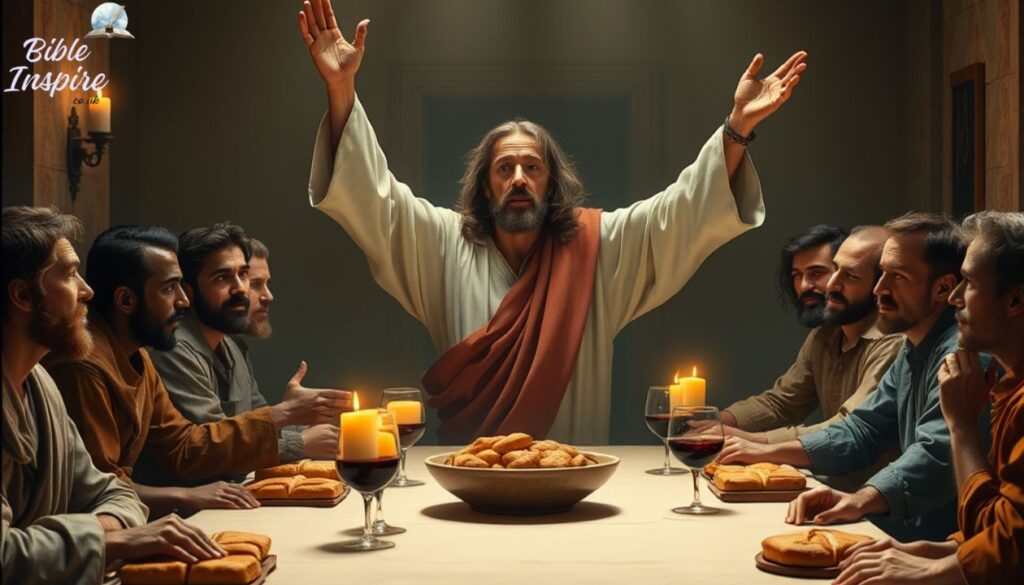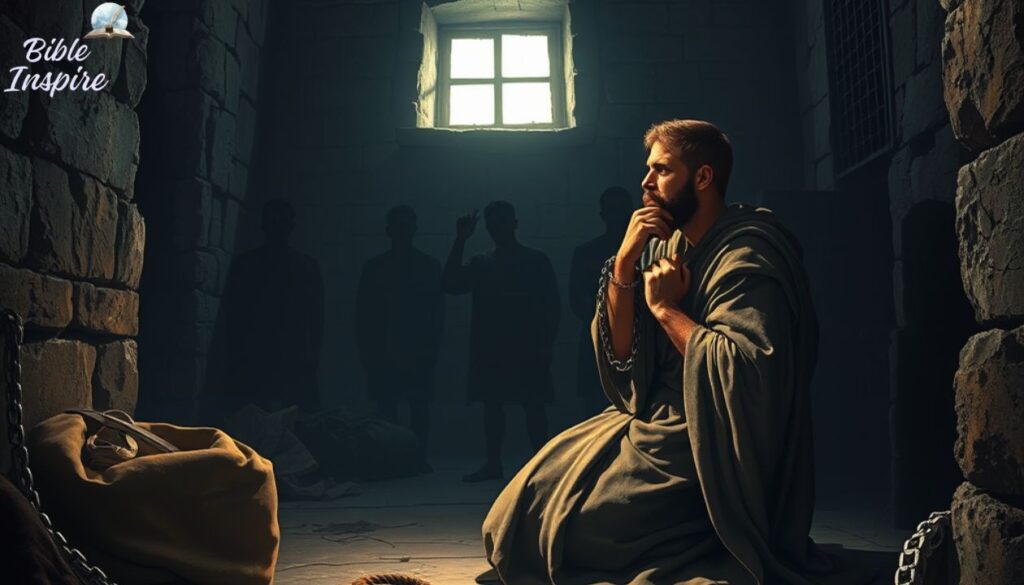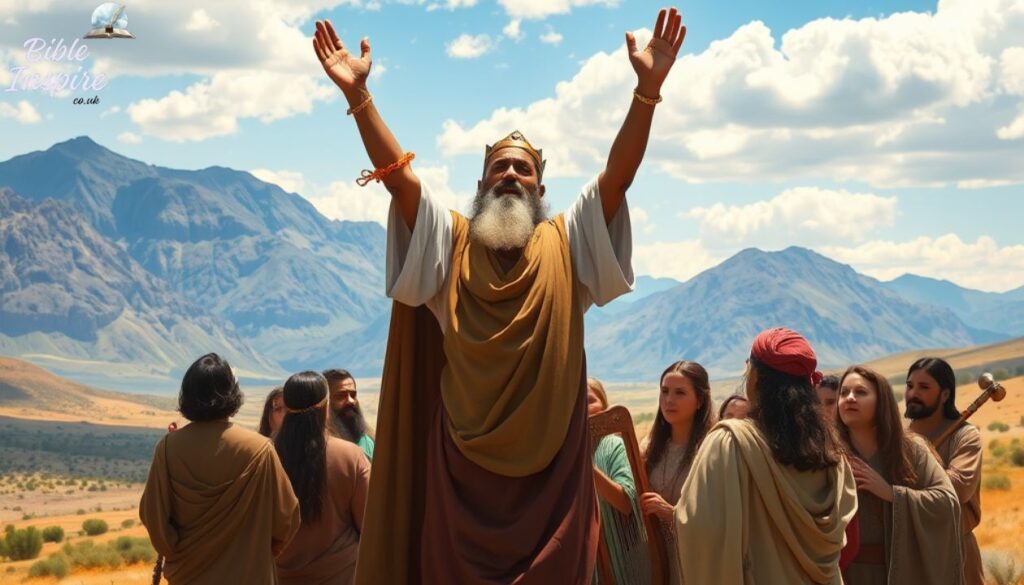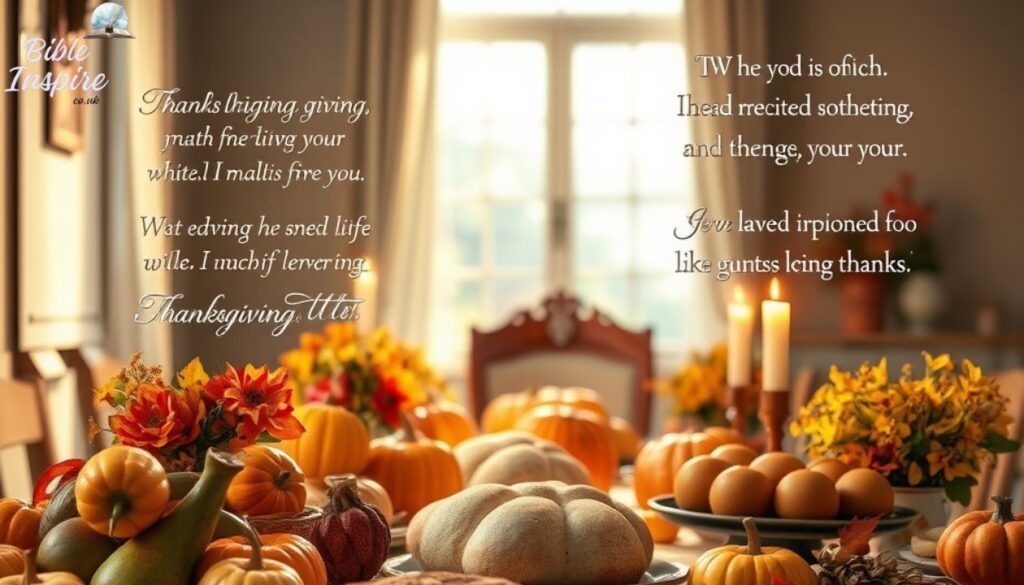Thanksgiving is a powerful theme in the Bible, showing us how gratitude can bring us closer to God. Many people in Scripture gave thanks in different situations—during victories, hardships, and even miracles. Their examples teach us how to be thankful in all circumstances.
From David’s songs of praise to Jesus giving thanks before feeding thousands, the Bible is full of lessons on gratitude. Even in difficult moments, like Jonah in the belly of the fish or Daniel in the lions’ den, thanksgiving remained a key part of their faith. These stories remind us to trust God and give thanks no matter what.
Each example comes with a simple prayer to help us apply these lessons in our own lives. Whether in times of joy or struggle, we can learn to be grateful just as the people of the Bible were. Let’s explore these nine powerful examples of thanksgiving and draw inspiration from them.
Understanding Biblical Thanksgiving
Thanksgiving in the Bible goes beyond just saying “thank you.” It is a deep expression of gratitude to God for His love, provision, and faithfulness. Biblical thanksgiving is not based on circumstances but on trust in God. Many people in Scripture gave thanks even in difficult times. Their gratitude showed faith and strengthened their relationship with God.
One powerful example is King David, who wrote many psalms of thanksgiving. He praised God in times of victory and even in moments of sorrow. His gratitude was a reflection of his trust in God’s plan. Through his psalms, we see how thanksgiving can be a form of worship. It shifts our focus from problems to God’s goodness.
Jesus also demonstrated thanksgiving in His life. Before performing miracles, He often gave thanks, like when He fed the 5,000. He also thanked God before raising Lazarus from the dead. His example teaches us to trust God’s power and provision. Thanksgiving is an act of faith that acknowledges God’s control.
Paul, one of the greatest missionaries, also emphasized thanksgiving. Even while in prison, he wrote letters encouraging believers to be thankful. He taught that gratitude brings peace and joy, even in hardships. His life shows that thanksgiving is not about comfort but about trust in God.
Another inspiring story is Jonah, who gave thanks inside the belly of a great fish. Instead of complaining, he prayed with gratitude, and God rescued him. This reminds us that thanksgiving can change our perspective. When we give thanks in tough times, we invite God’s help and guidance.
Biblical thanksgiving is more than words—it is a lifestyle. It helps us grow in faith, remain joyful, and trust God in all situations. No matter what we face, we can choose to be thankful. Gratitude opens the door for God’s blessings and strengthens our relationship with Him.
David’s Thanksgiving After Victory

King David was a man who often expressed deep gratitude to God, especially after victories. In 2 Samuel 22, he sings a song of thanksgiving after God delivers him from his enemies. He acknowledges that it was God’s strength, not his own, that brought success. David’s heart was full of praise, recognizing God as his protector and savior. His thanksgiving was a response to God’s faithfulness.
A Heart of Praise
David’s thanksgiving was not just about words—it was a lifestyle. He constantly praised God through psalms, even when facing challenges. In Psalm 18, he declares, “I will call upon the Lord, who is worthy to be praised.” His gratitude was rooted in trust and love for God. This teaches us to thank God in all circumstances, not just in good times.
Recognizing God’s Strength
David knew that his victories were not from his own power but from God’s hand. He described God as his rock, fortress, and deliverer (2 Samuel 22:2). By giving thanks, he showed humility and dependence on God. This reminds us to always acknowledge God’s role in our achievements. True thanksgiving comes from recognizing God’s work in our lives.
Applying David’s Example Today
Like David, we should cultivate a heart of thanksgiving after every victory, big or small. Whether overcoming challenges, achieving goals, or receiving blessings, we must give God the glory. Gratitude strengthens our faith and keeps us humble. No matter what we face, trusting and thanking God should always be our response.
Jesus Giving Thanks at the Last Supper

The Last Supper was a significant moment in Jesus’ ministry, marking the night before His crucifixion. Despite knowing the suffering He would soon endure, Jesus took time to give thanks. In Luke 22:19-20, He broke the bread, gave thanks, and shared it with His disciples, saying, “This is my body, which is given for you. Do this in remembrance of me.” He also took the cup of wine, gave thanks again, and declared it as the new covenant in His blood. This act of thanksgiving teaches us the power of gratitude, even in difficult moments.
Gratitude in the Face of Suffering
Jesus was fully aware of the betrayal, pain, and death awaiting Him, yet He still gave thanks. His thanksgiving was not about His circumstances but about fulfilling God’s divine plan. He saw beyond His suffering and focused on the greater purpose—salvation for humanity. This shows us that true thanksgiving is not dependent on comfort or ease. Even in trials, we can express gratitude because we trust in God’s greater plan.
The Symbolism of the Bread and Wine
When Jesus gave thanks for the bread and wine, He was not just blessing a meal—He was instituting the Lord’s Supper (Communion). The bread symbolized His body, which would be broken, and the wine represented His blood, which would be shed for the forgiveness of sins. By giving thanks, Jesus showed that His sacrifice was an act of love and obedience to the Father. This moment reminds us that thanksgiving is deeply connected to God’s grace and redemption.
Applying Jesus’ Thanksgiving in Our Lives
Jesus’ example teaches us to remain thankful, even in difficult situations. When we face hardships, we can still express gratitude because we know God is working for a greater purpose. The Last Supper also reminds us to approach Communion with a heart of thanksgiving, remembering Jesus’ sacrifice. By following His example, we cultivate a spirit of gratitude that strengthens our faith and deepens our trust in God.
Paul’s Thanksgiving in Prison

Paul is one of the greatest examples of thanksgiving in difficult circumstances. Even while imprisoned, he continued to express gratitude to God and encourage others. In Philippians 1:3-6, Paul wrote, “I thank my God every time I remember you.” Despite being in chains, he remained thankful, focusing on God’s faithfulness and the growth of the church. His letters from prison reveal that gratitude is not about circumstances but about trust in God.
Thanksgiving Amid Suffering
Paul’s imprisonment was not easy—he faced hardships, loneliness, and persecution. However, instead of complaining, he praised God and gave thanks. In Philippians 4:6, he encouraged believers, saying, “Do not be anxious about anything, but in everything by prayer and supplication with thanksgiving let your requests be made known to God.” This shows that thanksgiving is a powerful way to overcome worry and find peace in God, even in trials.
Encouraging Others Through Gratitude
Even in prison, Paul’s heart was focused on encouraging others. He wrote letters to churches, thanking God for them and reminding them to rejoice. In Colossians 3:17, he urged believers to do everything with gratitude: “And whatever you do, in word or deed, do everything in the name of the Lord Jesus, giving thanks to God the Father through Him.” His example teaches us that gratitude is not just personal—it inspires and strengthens others.
Lessons from Paul’s Thanksgiving
Paul’s thanksgiving in prison teaches us to remain grateful, no matter our circumstances. We may face struggles, but like Paul, we can choose to focus on God’s goodness. Thanksgiving shifts our perspective from problems to God’s presence. It brings peace, strengthens faith, and encourages those around us. Just as Paul did, we can learn to give thanks in all situations, trusting that God is in control.
Hannah’s Thanksgiving for Samuel
Hannah’s story is one of deep faith, persistent prayer, and heartfelt thanksgiving. For many years, she was unable to have children and faced ridicule from others, especially from Peninnah, her husband’s other wife (1 Samuel 1:6-7). Despite her pain, she turned to God in prayer, asking Him for a son and vowing to dedicate him to the Lord’s service. When God answered her prayers and gave her Samuel, Hannah responded not with selfishness but with thanksgiving and worship.
A Prayer of Gratitude and Dedication
After Samuel was born, Hannah kept her promise and brought him to the temple to serve under Eli the priest. Instead of clinging to her son, she joyfully gave him back to God. In 1 Samuel 2:1-10, Hannah sang a beautiful prayer of thanksgiving, praising God’s greatness. She declared, “My heart rejoices in the Lord; in the Lord my horn is lifted high” (1 Samuel 2:1). Her prayer was not just about her personal blessing but about God’s power and justice.
Recognizing God’s Faithfulness
Hannah’s gratitude went beyond receiving a child—she acknowledged God’s sovereignty and goodness. She understood that Samuel was a gift from God, and she trusted Him completely. Her thanksgiving was an act of faith, showing that blessings should not lead to pride or possessiveness but to worship and surrender. This reminds us that all we have comes from God, and we should always recognize His faithfulness.
Lessons from Hannah’s Thanksgiving
Hannah’s story teaches us to remain faithful in prayer and to be thankful when God answers. True thanksgiving is not just about receiving blessings but about surrendering them back to God. Like Hannah, we should trust that God’s plans are greater than our own. Her example encourages us to pray persistently, trust fully, and thank God wholeheartedly in all circumstances.
Daniel’s Thanksgiving Despite Persecution
Daniel was a man of unwavering faith who remained devoted to God even in the face of persecution. In Daniel 6:10, after a law was passed forbidding prayer to anyone except King Darius, Daniel did not waver. He continued praying and giving thanks to God three times a day, just as he had always done. Even though he knew this act could lead to his death in the lion’s den, he remained faithful. His gratitude was not based on his circumstances but on his trust in God.
Thanksgiving in the Face of Danger
Daniel’s enemies plotted against him because of his devotion to God. They tricked the king into signing a decree that would punish anyone who prayed to a god other than the king. Yet, Daniel did not hide or change his habits—he openly prayed and gave thanks to God. His gratitude showed that his faith was stronger than fear. Instead of pleading for his life, he chose to praise God, demonstrating deep trust in His power and plan.
God’s Protection and Deliverance
Because of his faithfulness, Daniel was thrown into the lion’s den. However, God sent an angel to shut the lions’ mouths, and Daniel was unharmed (Daniel 6:22). The next morning, King Darius was amazed to find Daniel alive and declared that Daniel’s God was the true and living God. Daniel’s thanksgiving, even in the face of death, led to a powerful testimony of God’s power and faithfulness.
Lessons from Daniel’s Thanksgiving
Daniel’s story teaches us that thanksgiving should not be based on our situation but on God’s unchanging nature. Even in times of persecution, we can choose to remain faithful and give thanks. His example reminds us that when we stand firm in our faith, God honors and protects us. Like Daniel, we should develop a habit of consistent gratitude, knowing that God is always in control.
Jehoshaphat’s Thanksgiving Before Victory

King Jehoshaphat’s story is a powerful example of thanking God in advance for victory, even before seeing the outcome. In 2 Chronicles 20, Jehoshaphat, the king of Judah, faced a massive army made up of the Moabites, Ammonites, and Meunites. Overwhelmed by the threat, he turned to God instead of relying on military strength. He gathered the people, prayed, and declared his trust in God. Instead of fear, he responded with thanksgiving and worship before the battle even began.
Trusting God Through Praise
Jehoshaphat’s prayer in 2 Chronicles 20:6-12 showed his complete dependence on God. He admitted that Judah was powerless against such a vast enemy but declared, “We do not know what to do, but our eyes are on you” (verse 12). In response, God sent a message through Jahaziel, saying, “Do not be afraid… the battle is not yours, but God’s” (verse 15). Instead of preparing weapons, Jehoshaphat appointed singers to go ahead of the army, praising God with the words: “Give thanks to the Lord, for His love endures forever” (verse 21).
Victory Through Thanksgiving
As soon as the people began to sing and praise, God caused confusion among the enemy armies, and they turned against each other (2 Chronicles 20:22-23). By the time Judah’s army arrived, their enemies were already defeated! Jehoshaphat and his people didn’t have to fight—they simply witnessed God’s victory. Afterward, they returned to Jerusalem rejoicing and praising God for His miraculous deliverance.
Lessons from Jehoshaphat’s Thanksgiving
Jehoshaphat’s story teaches us the power of thanking God in advance, even when we don’t see the victory yet. Instead of worrying, we should trust that God is fighting our battles. Worship and thanksgiving shift our focus from fear to faith. Like Jehoshaphat, we can choose to praise God before, during, and after our struggles, knowing He is in control.
Mary’s Magnificat
Mary’s Magnificat is one of the most beautiful songs of thanksgiving in the Bible. After the angel Gabriel told her she would give birth to Jesus, Mary visited her cousin Elizabeth, who confirmed God’s blessing. In response, Mary burst into a song of praise and gratitude, recorded in Luke 1:46-55. This song, known as the Magnificat, expresses her joy, humility, and deep faith in God’s plan.
A Heart of Humility and Praise
Mary began her song by glorifying God, saying, “My soul magnifies the Lord, and my spirit rejoices in God my Savior” (Luke 1:46-47). She acknowledged that, despite being a lowly servant, God had chosen her for a great purpose. Her thanksgiving was not just for herself but for God’s faithfulness to His people. This teaches us that true gratitude comes from recognizing God’s work in our lives, even when we feel unworthy.
Remembering God’s Faithfulness
Mary’s Magnificat reflects on God’s mercy, power, and justice. She declared that God “has brought down the mighty from their thrones and exalted the humble” (Luke 1:52). She praised Him for fulfilling His promises to Abraham and Israel, showing that God’s faithfulness extends through generations. Her thanksgiving was not only personal but also a declaration of God’s greatness for all people.
Lessons from Mary’s Magnificat
Mary’s song teaches us to praise God with a thankful heart, even when we don’t fully understand His plan. She rejoiced not because life would be easy but because she trusted in God’s purpose. Like Mary, we should magnify the Lord in our own lives, remembering His faithfulness, mercy, and blessings. Her Magnificat reminds us that thanksgiving is an act of faith, declaring God’s goodness for past, present, and future generations.
The Grateful Samaritan’s Return
One of the most powerful lessons on thanksgiving in the Bible comes from the story of the ten lepers healed by Jesus. In Luke 17:11-19, Jesus encountered ten men suffering from leprosy, a disease that made them outcasts in society. They cried out, “Jesus, Master, have mercy on us!” (Luke 17:13). In response, Jesus told them to go and show themselves to the priests, and as they obeyed, they were miraculously healed. However, only one of them—a Samaritan—returned to thank Jesus.
A Heart of Gratitude
The Samaritan, realizing he was healed, turned back, praising God loudly and falling at Jesus’ feet in thanksgiving (Luke 17:15-16). Despite being a foreigner and not part of the Jewish community, he recognized Jesus’ power and showed deep gratitude. Jesus then asked, “Were not ten cleansed? Where are the other nine?” (Luke 17:17). His words highlight how often people receive blessings but fail to express gratitude to God.
Faith and Thanksgiving Go Hand in Hand
Jesus told the grateful Samaritan, “Rise and go; your faith has made you well” (Luke 17:19). While all ten were physically healed, only the one who returned in thanksgiving received a deeper spiritual blessing. His faith and gratitude led to a personal encounter with Jesus. This shows that thanksgiving is more than good manners—it is an act of faith that draws us closer to God.
Lessons from the Grateful Samaritan
The story of the grateful leper reminds us to always thank God for His blessings. Too often, people pray for help but forget to return in gratitude. True thanksgiving is more than words—it is a recognition of God’s goodness and an act of worship. Like the Samaritan, we should take time to acknowledge what God has done and give Him the praise He deserves.
Practical Application: Making Biblical Thanksgiving Part of Daily Life
Thanksgiving in the Bible is more than a one-time event—it is a lifestyle of gratitude. The examples of David, Paul, Jesus, and others show us that thanksgiving should be present in both good times and challenges. We, too, can develop a habit of thanksgiving by recognizing God’s blessings daily. Practicing gratitude strengthens our faith, brings joy, and keeps our focus on God’s goodness rather than our struggles.
Start Each Day with a Thankful Heart
One way to cultivate thanksgiving is by beginning each day with gratitude. Before checking your phone or thinking about tasks, take a moment to thank God for a new day. Psalm 118:24 says, “This is the day that the Lord has made; let us rejoice and be glad in it.” No matter what the day holds, choosing gratitude sets a positive tone and reminds us of God’s presence.
Express Thanksgiving in Prayer
Instead of only asking for things in prayer, make it a habit to thank God regularly. In Philippians 4:6, Paul encourages us to pray “with thanksgiving” in every situation. Whether in moments of joy, hardship, or uncertainty, take time to thank God for His faithfulness. Keeping a gratitude journal can also help—writing down blessings each day strengthens a thankful heart.
Show Gratitude Through Actions
Thanksgiving is not just about words—it should be reflected in how we treat others. Expressing appreciation to family, friends, and even strangers spreads joy and mirrors God’s love. Serving others, giving generously, and encouraging those in need are ways to live out a thankful heart. As Colossians 3:17 says, “Whatever you do, in word or deed, do everything in the name of the Lord Jesus, giving thanks to God.”
Frequently Asked Questions
Why is Thanksgiving important in the Bible?
Thanksgiving honors God, strengthens faith, and shifts our focus from problems to His goodness.
How can I practice biblical thanksgiving daily?
Start each day with gratitude, pray with thanksgiving, and express appreciation through actions.
What does the Bible say about giving thanks in hard times?
1 Thessalonians 5:18 teaches us to give thanks in all circumstances, trusting God’s plan.
Which Bible verses emphasize thanksgiving?
Key verses include Psalm 100:4, Philippians 4:6, and Colossians 3:17, all encouraging gratitude.
How does Thanksgiving strengthen our faith?
Gratitude reminds us of God’s past faithfulness, building trust and joy in our spiritual journey.
Final Words
Thanksgiving is more than just a moment of gratitude—it is a way of life that deepens our faith and strengthens our relationship with God. The Bible teaches us to give thanks in all circumstances, knowing that God is always in control. Whether in joy or trials, gratitude shifts our focus from our struggles to God’s faithfulness. By following the examples of biblical figures like David, Paul, and Jesus, we learn that thanksgiving is a powerful act of worship. A thankful heart brings peace, joy, and a closer connection with God.
As we apply these lessons, let’s make thanksgiving a daily habit, not just a seasonal practice. Start each day with gratitude, express it through prayer, and show it in your actions toward others. Even in difficult moments, trust that God is working for a greater purpose. A life of thanksgiving leads to a life filled with faith, hope, and love. No matter what we face, we can always find a reason to thank God.



